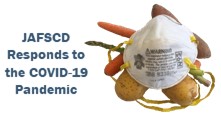Providing planetary health diet meals to low-income families in Baltimore City during the COVID-19 pandemic
DOI:
https://doi.org/10.5304/jafscd.2020.101.010
Keywords:
COVID-19, Pandemic, EAT-Lancet, Food Insecurity, Planetary Health Diet, Minority Health, SustainabilityAbstract
The COVID-19 pandemic has increased food insecurity, especially among low-income Black and Hispanic families in the United States. Food insecurity is associated with poorer health and higher mortality in adults and greater risk of impaired cognitive development and behavioral problems in children. Providing food for low-income families is an important priority of the COVID-19 response. Food That Connects Us All is a program that provides healthy meals to low-income Black and Hispanic families in Baltimore City. The meals follow guidelines for the planetary health diet, a reference diet developed by the EAT-Lancet Commission to optimize health and be sustainable within planetary boundaries. The planetary health diet consists largely of vegetables, fruit, whole grains, legumes, nuts, and unsaturated oils, with a low to moderate amount of seafood and poultry and with little or no red or processed meats, refined grains, starchy vegetables, and added sugar. In a food survey, participants showed a high level of satisfaction with the taste, appearance, and healthfulness of the meals. Food That Connects Us All is a direct approach to reducing health disparities and demonstrates the feasibility of providing an ideal reference diet to vulnerable low-income families at high risk for poor health outcomes during the pandemic.
Metrics

Downloads
Published
How to Cite
Issue
Section
Categories
License
Copyright (c) 2020 The Authors

This work is licensed under a Creative Commons Attribution 4.0 International License.
The copyright to all content published in JAFSCD belongs to the author(s). It is licensed as CC BY 4.0. This license determines how you may reprint, copy, distribute, or otherwise share JAFSCD content.












